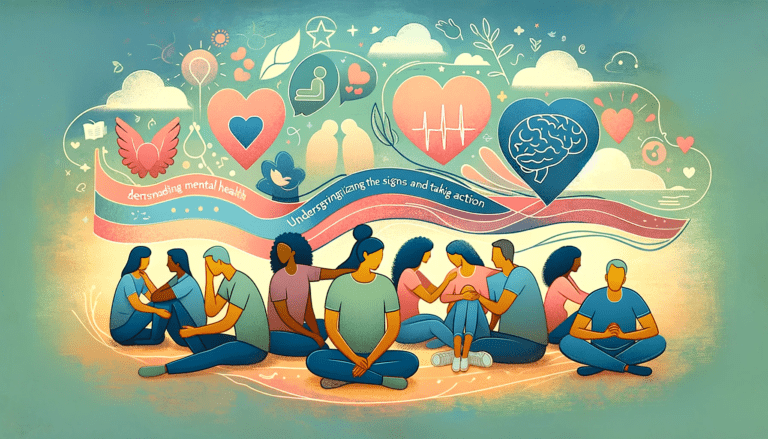Understanding Mental Health: Breaking the Stigma and Promoting Well-Being
Mental health is often one of the most overlooked aspects of overall well-being, despite its significant impact on our daily lives. In recent years, the conversation around mental health has gained more visibility, but there’s still a long way to go in breaking down the stigma surrounding it. Whether it’s stress from work, personal challenges, or something more serious, mental health affects us all in different ways. Understanding mental health is crucial, not just for those dealing with it firsthand but for creating a society that is supportive, informed, and empathetic.
The Importance of Mental Health
Mental health refers to our emotional, psychological, and social well-being. It affects how we think, feel, and behave, and plays a role in how we handle stress, relate to others, and make choices. Just like physical health, mental health requires attention, care, and sometimes intervention. When we think of health, we often picture physical conditions, but mental health is just as essential. It shapes how we experience life, how we cope with challenges, and ultimately how we interact with the world.
Unfortunately, mental health issues can often be invisible. Many individuals struggle silently with conditions such as depression, anxiety, and PTSD, which can have a significant impact on their ability to function and live fulfilling lives. For others, the pressure to keep up with daily demands—work, family, finances—can lead to stress and burnout. This is where it becomes essential to recognize the signs and seek help when needed.
Breaking the Stigma
One of the biggest barriers to addressing mental health issues is stigma. The societal stigma that surrounds mental health can prevent individuals from seeking help, speaking out, or acknowledging their struggles. This stigma is often rooted in misunderstandings, misconceptions, and fear of judgment. Many people fear being labeled or treated differently if they admit to struggling with mental health, which leads to isolation and worsening of symptoms.
To combat this, it’s essential to foster an environment of openness and acceptance. More individuals need to speak out about their experiences with mental health, whether they’re public figures or not, to normalize these conversations. Education is a powerful tool for dispelling myths about mental health, such as the idea that those dealing with mental illnesses are weak or incapable of functioning normally. We need to recognize that mental health struggles do not reflect an individual’s worth or potential.
Practical Steps for Taking Care of Your Mental Health
Taking care of mental health isn’t just about managing symptoms when they arise. It’s about creating a lifestyle that promotes well-being on a day-to-day basis. Here are a few strategies that can help anyone maintain a healthy mental state:
-
Prioritize Self-Care: Self-care is not a luxury; it’s a necessity. Whether it’s through getting enough sleep, eating nutritious food, or engaging in activities that bring joy, prioritizing self-care helps keep the mind and body balanced.
-
Stay Active: Regular physical activity has been shown to improve mental health. Exercise releases endorphins, which are chemicals in the brain that improve mood and reduce stress. It doesn’t have to be intense—simple activities like walking or yoga can make a significant difference.
-
Build a Support System: Surrounding yourself with people who understand and support you is crucial for mental well-being. Having a strong support system of friends, family, or colleagues can provide comfort during difficult times and reduce feelings of isolation.
-
Practice Mindfulness and Meditation: Techniques like mindfulness and meditation help reduce anxiety, increase focus, and improve emotional regulation. By practicing mindfulness, we become more aware of our thoughts and feelings, which can help us manage them more effectively.
-
Seek Professional Help When Needed: Just as we wouldn’t hesitate to visit a doctor for a physical ailment, seeking therapy or counseling when dealing with mental health challenges is just as important. Mental health professionals can offer valuable tools and insights for coping with stress, trauma, and other issues.
The Role of Technology in Mental Health
In today’s digital world, technology plays a complex role in mental health. On one hand, social media and constant connectivity can contribute to stress, anxiety, and feelings of inadequacy. On the other hand, there are numerous online resources, apps, and platforms that provide support, therapy, and educational tools to improve mental health.
For example, mental health apps like Headspace or Calm offer guided meditation and relaxation exercises, while other platforms like BetterHelp and Talkspace allow people to connect with therapists remotely. These tools are helping to make mental health support more accessible and removing barriers for those who may not have access to in-person care.
Mental Health in the Workplace
Mental health is also an important topic within the workplace. High demands, unrealistic expectations, and poor work-life balance contribute to stress, burnout, and anxiety. In recent years, many companies have begun to recognize the importance of mental health in the workplace, offering programs that focus on well-being and stress management.
As individuals, we must learn to set boundaries and communicate our needs to maintain a healthy work-life balance. Employers can create supportive environments by encouraging open dialogue about mental health, providing resources for employees, and fostering a culture of understanding.
Conclusion
Mental health is not something that should be ignored or pushed aside. It’s just as important as physical health, and it requires proactive care, understanding, and support. By breaking down the stigma and promoting open, honest conversations about mental well-being, we can create a healthier, more supportive society for everyone.
Remember, it’s okay to not be okay. Seeking help is a sign of strength, not weakness. Take the time to care for your mental health, and encourage those around you to do the same. Together, we can create a world where mental health is prioritized and understood.







